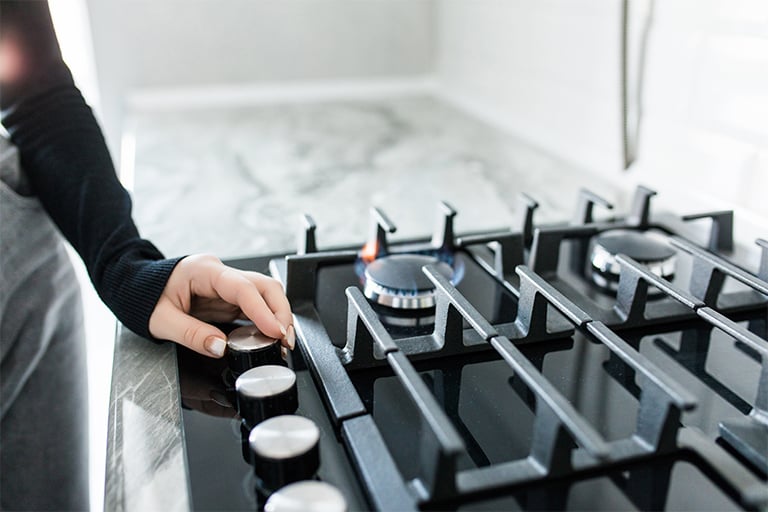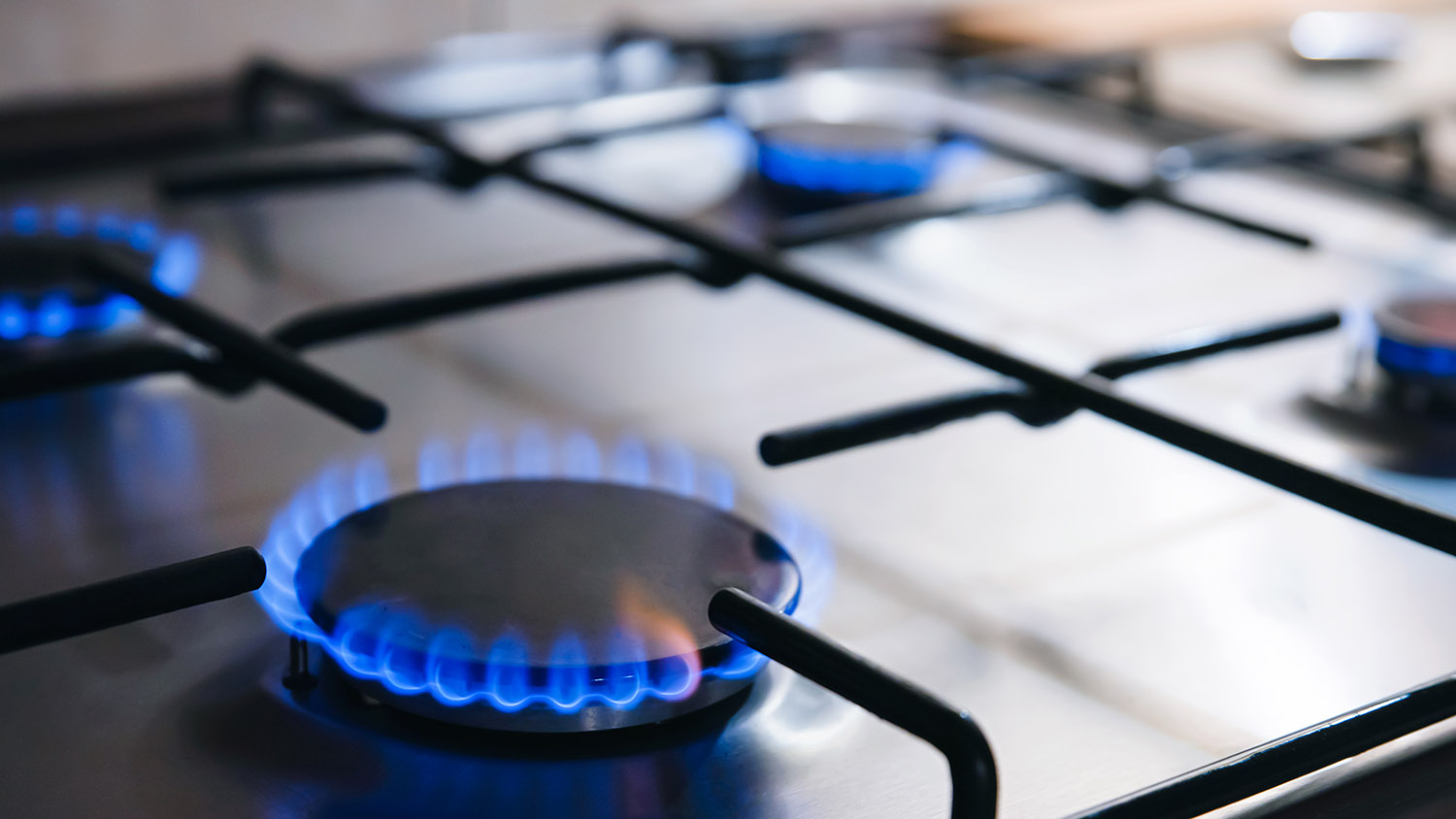
Range hoods come in various styles and help keep your kitchen clear of odors, smoke, and grease. Here’s how much it costs to install a range hood by type.
If your oven smells like gas, there are steps you can take to stay safe


It’s normal to smell an odor for a few seconds before seeing the flame on the range.
A gas leak smells different, like rotten eggs.
A hissing sound can indicate a puncture in the gas tank and some leakage.
Go outside and call 911 or the gas company’s emergency line if you suspect a leak.
The smell of natural gas is never a good thing, so it's understandable that you may be worried. There could be many reasons a gas odor is coming from the oven, including a faulty igniter, food or waste buildup, or blocked venting. Here's how you can understand, diagnose, and fix this problem.
Note: If you suspect a gas leak, don’t touch anything electrical. Get safely outside of your home and call 911 or your gas company’s emergency line.
If you notice a gas smell shortly after turning on your oven, it could be caused by a failing gas igniter. If the gas igniter isn’t working properly, that means it’s opening slowly and not releasing enough gas to light the oven flame as quickly as it should. If you suspect your gas igniter is failing, hire a local electrician to test and replace that feature.
When was the last time you cleaned your oven? If it’s been a long time since you last scrubbed down the inside of your oven, the buildup of debris and food particles could be causing your oven to release a gassy smell. Caked-on debris can burn or block gas flow in your oven, leading to unusual odors and potential issues. To resolve this problem, maintain your oven like a pro to keep it safe and clean.
Odorant is an additive containing chemicals that produce the sulfur-like smell we associate with gas leaks. Depending on how often your gas company adds odorant to the supply lines, you may notice this smell is more concentrated when your gas tanks are low. However, this smell should dissipate as soon as the oven is lit. If the smell persists or strengthens, you likely have a gas leak.
If something is blocking your oven vents, that could be the cause of the suspicious gas smell. Check inside your oven to ensure there aren’t any objects left inside, like a forgotten pan or oven mat. You should also ensure that there is no food residue or buildup blocking the oven vents.
While foils are a convenient option for DIY oven liners, they can unintentionally block oven air vents and trap food debris. It can also lead to improper combustion. These all eventually make your oven have a gasy smell. However, there won’t be any real gas leaks. If you want to use foil as liners, you should only cover parts of your rack with foil and always remove it once you’re done cooking.
If you have a gas stove, the gas odor can be coming from a surface burner that was left on. If a knob is left in the “on” position, your burner will continue to let out gas and eventually causing a gas odor.
If your oven is emitting a strong, consistent smell of rotting eggs, you should assume you have a gas leak and take serious precautions. Another sign of a gas leak is a hissing sound. As mentioned above, if you suspect a gas leak (or you left your oven on), you should immediately evacuate your home and call 911 or your gas company’s emergency line.
Working with gas can be very dangerous and even harmful to your health. Only attempt gas projects yourself if you have the experience and credentials to do so safely. Otherwise, let the professionals handle these jobs.

If you just turned your gas range’s stove or oven on, it's not unusual to smell a brief, faint smell of gas, as the burner lights with a small flame at first. You could also have built-up soot, making the gas smell in your oven smell stronger. It doesn’t hurt to check and see if you should give it a cleaning.
If you notice an unpleasant odor (that rotten egg smell) from your oven for more than a few seconds after turning it on, there could be a gas leak. Your home will need immediate attention.
If you smell gas while your gas oven isn't heating up, it might be a sign of an oven malfunction. The best course of action would be to contact your gas company, and then call the service provider or manufacturer for help with this problem if your oven is broken. If you don't have a warranty in use, you may have to pay for the cost of an oven repair.
Regardless of how old it is, ovens should never emit the smell of gas while you’re using them. If you hear a hissing sound when your gas valve is on, that's an indication that there may have been a puncture in the gas tank and some leakage. Even if you don’t hear anything, if you smell gas when your oven is on, that could indicate leakage.
If you suspect a gas leak, do the following:
Turn off the oven as soon as possible.
Open as many windows as possible.
Extinguish any open flames.
Go outside where it’s safe.
Call your gas supplier’s emergency line or 911.
Contact a Pro.
Note: Don’t touch any electrical switches—doing so could lead to an accidental shock and possibly a fire.
Your gas company will almost always come out to detect the smell. Some companies only test outside, but many check on the inside, too. If you call 911, fire departments will send a firefighter with a combustible gas sniffer to check it out and determine if they can detect any gas when the oven is off. If they notice a problem, they’ll determine the next best course of action.
You may also have physical symptoms of gas poisoning, such as dizziness, a headache, or nausea. If you experience any of these symptoms, get out of your property and contact emergency services in your area.
Don’t use your stove until you’re sure there’s no trace of any leaks from the connection line between the stem and burner.
Gas range maintenance is essential for preventing gas emissions. Providers usually offer at least one year's warranty and an annual inspection service for free.
Remember: Leakages should be inspected and repaired by professionals only.
Here are some basic safety precautions you should take when dealing with natural gas:
Position at least one carbon monoxide detector in your kitchen and on each level of your home.
Familiarize yourself with the symptoms of overexposure to natural gas.
If you hear the hissing sound of gas near a gas line, evacuate your home immediately.
Be aware of the location of your gas line and how to turn off its flow if authorities recommend it.
Never use a gas oven as a substitute heat source.
Don't place aluminum foil or other objects on the bottom of the oven cavity, and don't block the furnace vents that lead into the oven.
Only use gas ovens when there’s someone to attend to them.
Never use a combustible oven cleaner in a gas oven.
Always read the instructions on hazardous items before using them, and never store chemicals in or near an oven.
Be aware that gas ovens are high-risk appliances and must be installed or repaired by a certified local gas appliance repair technician.
The average oven repair costs between $200 to $600, which far outweighs the potential dangers of a faulty DIY on a gas oven.
Gas ovens use pilot ignition, which relies on a pilot light or gas flame. When the thermostat is on, the vent gets bigger as it opens and heats up. The safety vents open and allow for increased gas burning to heat up and ignite the activity in the burner.

Understanding the different parts of your gas range can help you determine what could be causing the smell:
Range/burner: Gas oven ranges and stovetops use a burner to warm the space and an electric fan inside to help distribute heat.
Pilot light: The flame that ignites the gas when you’re cooking is what causes the unpleasant smell.
Pilot gas supply line: This is the connection that supplies gas to the pilot light.
Thermostat: This controls whether the oven bakes or broils at various temperatures. Electric ovens use these, too. Calibrate your oven so it functions properly.
Control panel and valves: The knobs that switch on and off, in conjunction with the pilot light and burner, can be adjusted to control heat temperature. The valve supplies the gas and can turn on or off. If another oven gas valve is necessary, contact your oven manufacturer or technician.
There are many reasons to switch from gas to electric cooking. For one, some regions may be phasing gas ovens completely out of new developments. Electric ovens are also easier to maintain, cleaner to cook with, and much safer. However, surface burners on electric ranges do not have the same precise temperature control. You should think twice before replacing your entire gas range with an electric model.
Another great alternative to a gas oven is a steam oven, often powered by electricity. Steamer ovens can lock in an ingredient’s flavor and nutrition and heat food up more quickly than a conventional gas oven. While basic steam ovens do not have a broiling and browning functionality, newer models are more likely to have that capacity.
If you rarely use your oven to cook large meals, an air fryer may be another suitable alternative. Air fryers are smaller desktop appliances that fry, cook, and even bake without consuming oil. They cook in healthier and more efficient ways compared to traditional gas ovens.
Wondering how your oven stacks up against other Angi customers? According to Angi data, nearly 51% of customers cite having an electric oven, while almost 47% report having a gas oven.
From average costs to expert advice, get all the answers you need to get your job done.

Range hoods come in various styles and help keep your kitchen clear of odors, smoke, and grease. Here’s how much it costs to install a range hood by type.

One of the most common fridge problems is a blown compressor motor. Use this guide to determine the cost of replacing the compressor and to estimate the total cost of your repair.

Get a clear estimate for stove repair costs. Learn what impacts pricing, compare repair vs. replacement, and find tips to save on your next stove repair.

Who fixes dryers if yours isn’t working? A dryer repair company is a good place to start, but you have some options, including an electrician.

You can usually unclog your dishwasher by cleaning the filter and using a DIY solution to clear the drain hose. Learn more with this step-by-step guide.

Unsure who to hire to install your range hood? Learn about the different professionals to consider and find the right one for your project.